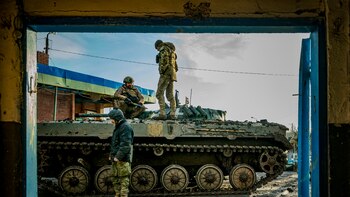About twenty men dressed in camouflage clothing and balaclavas are waiting for a bus to cross the border from Poland to Ukraine. They come from the United States and elsewhere to be part of the so-called International Legion, ready to give their lives to liberate the country from Russian invasion.
At the train station in Przemysl, a small town on the border with Ukraine, young and middle-aged men from the United States, Canada, Spain or France rush the last puff of cigarettes while watching the schedules of a bus that will take them to the Ukrainian border.
Many of them have no military experience whatsoever, nor have they ever grabbed a rifle, but they are all clear that fighting on the eastern Ukrainian front, where the bloody fighting with Russian troops is taking place, is the only way to stop the war.
His intention is to join the so-called International Legion, a body of volunteers that already brings together nearly 20,000 troops of fifty different nationalities.
WILLING TO DIE IN UKRAINE
“On March 1, I woke up and decided that I had to do something. Anything to make this stop,” tells Efe Craig, a 55-year-old US citizen from Colorado, who claims he has never used a gun but wants to go to Ukraine “mainly to fight.”

Craig arrived at the Ukrainian border a few days ago, but he has been planning the trip for a month, where he has raised about $30,000 to board a flight and go to fight.
“The best thing you can do is learn to fight and go to the front. Humanitarian aid is fine, but it is a greater need to recruit troops,” says this American with a gleaned figure and a gray-haired mane.
He says he is not scared, but he is “doubtful” because handling a gun is something “completely new” for him, but once he learns to “shoot before the Russians shoot”, he will be calmer.
Craig, like many others, came alone and did not have the courage to tell his family that he was going to Ukraine and that, perhaps, he would not return.
“If they found out, their souls would fall apart, just as it is happening to me now, when I talk to you. But it's what makes me see how committed I am to the cause,” he says with a thread of voice.

Having no experience, Craig explains that he will spend about four weeks training before being sent to the eastern Ukrainian front. He hopes to be accepted when his training ends, since “many are rejected” if they have nothing to contribute to the battle.
Max, another 24-year-old American who doesn't want to reveal his true identity, tells the EFE agency from the same station that he had to sell all the properties, such as his car, in order to afford to come and fight: “Apart from the backpacks I brought, I only have a box of things.”
The young man claims that he has military experience because he was in the US Navy and that “should not be wasted when there are civilians who have never grabbed a gun and who have been fully involved in a conflict that they have not chosen.”
“We may be handing out bottles of water all day, but it doesn't solve the problem,” Max explains why he chose to fight: “I'm willing to die in Ukraine if I have to,” he says.
BACK HOME AFTER BEING AT THE FRONT
Lee Darnell is a 48-year-old Tennessee chaplain who changed his missionary life in Africa and Haiti to head to Ukraine on the second day of the invasion. He has military experience and was at the front, with the rifle in one hand and the New Testament in another.

He is now in Kiev, which after being liberated last week became another line of the rear, with the aim of helping with logistical issues.
Lee explains that it was “easy” for him to enter the unit: he went through an interview process, they valued what he was good at and was “plugged in”, a luck that many others don't.
He tells EFE that the Ukrainian Army needs “more international aid to win the war” and that Ukrainians have “endured so much” thanks to international support in the form of sanctions against Russia, provision of military equipment or supplies.
Even so, he criticizes the “lack of leadership” of European politicians and Joe Biden's US Administration for not sending his troops to fight.
“The front is moving back and forth at times. There was a time when this city (Kiev) was part of the front, but regardless of where you are, the need to keep fighting until this is over is very important,” he says.

His intention now is to return home “for a while” to see his family, although he does not rule out returning to the battlefield, an experience of which he has “zero regrets” because he has been able to “help people, hug them, educate them about Jesus, supply food, fight and tinker with Russian tanks.”
“I have had many great honors in this life. I have been the father of my children, I have taken my granddaughter in my arms... But one of the great honors of my life now is to have stood by the side of the Ukrainian people and made sure that Kiev did not fall”, he says.
(with information from EFE)
KEEP READING:
Últimas Noticias
Debanhi Escobar: they secured the motel where she was found lifeless in a cistern

The oldest person in the world died at the age of 119

Macabre find in CDMX: they left a body bagged and tied in a taxi
The eagles of America will face Manchester City in a duel of legends. Here are the details

Why is it good to bring dogs out to know the world when they are puppies




